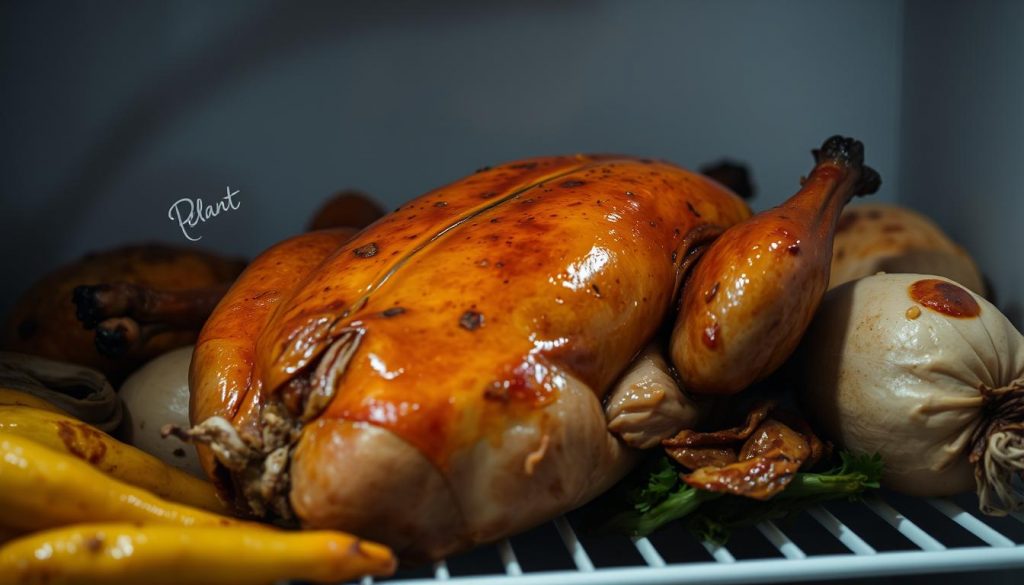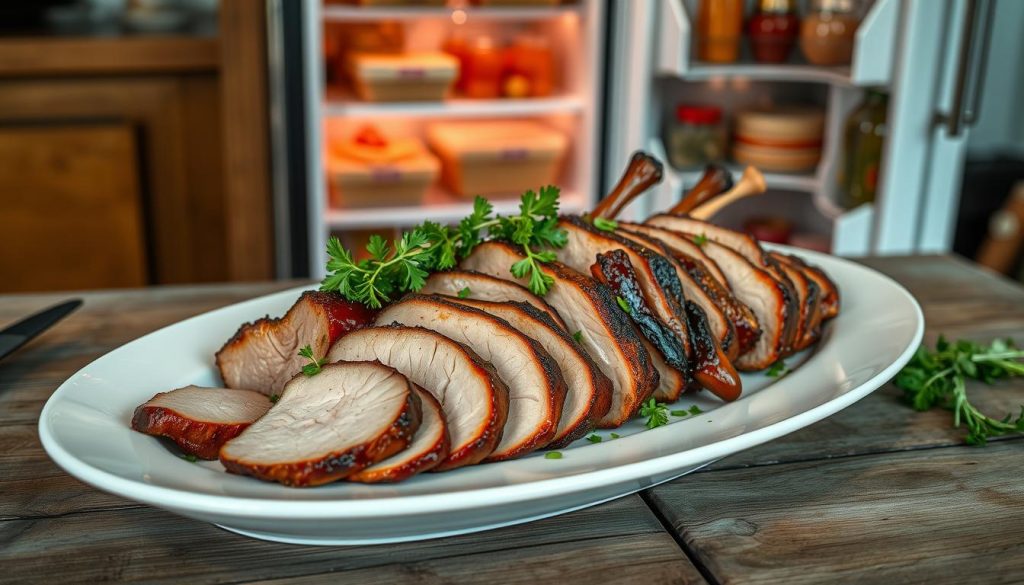Not all leftovers are the same, and cooked duck is no exception. You might wonder how long it stays good in the fridge. Cooked duck can last 3 to 4 days if you refrigerate it within a few hours of cooking. It’s important to know how to keep it safe and tasty.
Storing leftover duck right is key. Leaving it out can shorten its life. If you’re worried about food safety, these tips are for you. We’ll show you how to keep your duck fresh and safe to eat.
Key Takeaways
- Cooked duck is recommended to be stored in the fridge for 3-4 days, ensuring it’s refrigerated quickly after cooking.
- To maximize freshness, avoid leaving cooked duck at room temperature for extended periods.
- Observe recommended safety ranges, typically 5 days in the fridge, to judge the safety of cooked duck leftovers.
- Adhering to refrigerator storage tips and best practices is essential for leftover duck safety.
- Consider individual health conditions regarding food safety to prevent possible foodborne illnesses.
Understanding the Shelf Life of Cooked Duck
Knowing how long cooked duck lasts in the fridge is key for taste and health. This guide covers the important factors that affect cooked duck’s fridge life. It also talks about food safety and how to check if the duck is fresh.
Refrigeration and Food Safety Standards
Keeping cooked duck in the fridge right is vital for its quality and safety. It’s best to store it at 40°F (4°C) or below. This way, you can enjoy it safely for 3 to 4 days.
Peking Duck vs. Regular Roast: Does It Make a Difference?
Peking duck is famous for its crispy skin and flavors. But, its fridge life is similar to a regular roast duck. Both should be eaten within 3 to 4 days for the best taste and safety.
Gauging Freshness: Sensory Evaluation
Checking the duck’s smell, look, and feel is a good way to see if it’s fresh. Fresh duck smells good, looks firm, and has no sliminess. If unsure, it’s safer to throw it away to avoid sickness.
By following these tips, you can enjoy your cooked duck safely. This helps reduce waste and keeps everyone healthy. Remember these guidelines for storing cooked duck in your fridge!
Proper Storage Tips for Cooked Duck
To keep your cooked duck fresh and safe, follow a few key steps. These include keeping the right temperature, using the right containers, and freezing leftovers. Let’s explore these important steps to enhance both the taste and shelf life of your duck.
Best Practices on Temperature Control
Keeping the right temperature is key for safe duck storage. Your fridge should be at or below 40°F to stop bacteria from growing. Cooked duck should be eaten within one to two days to keep it fresh and safe.
Container Types to Prolong Freshness
The right containers can make your cooked duck last longer. Airtight containers or tightly wrapped plastic are best to prevent contamination and air exposure. For items like foie gras, refrigeration at 0 to 4°C for two to three weeks is safe and keeps it fresh.
Freezing Cooked Duck: Yay or Nay?
Freezing leftovers is a good way to keep cooked duck longer. You can freeze it in airtight containers or heavy-duty freezer bags for six to nine months. This keeps the duck’s quality and flavor for future meals. Here’s a quick comparison of refrigeration and freezing times for different duck products:
| Product | Refrigerator (Days) | Freezer (Months) |
|---|---|---|
| Fresh Duck | 1-2 | 6-9 |
| Whole Duck Foie Gras | Up to 10 | Up to 3 |
| Whole Goose Foie Gras | Up to 15 | Up to 3 |
| Semi-Cooked Foie Gras | 14-21 (0-4°C) | Up to 3 |
| Canned Foie Gras | Several years | N/A |
As shown, proper storage keeps your duck quality high and offers flexible future use. Whether in the fridge or freezer, following these tips ensures your duck stays safe and tasty.
How Long Does Cooked Duck Last in the Fridge
Understanding the refrigerator life of cooked duck is important. It tells us how long we can safely eat it before it goes bad. Cooked duck can last 3 to 4 days in the fridge if stored right.
It’s key to put the duck in the fridge quickly after cooking. Leaving it out for too long can make it less fresh and less safe. We want to keep it tasty and safe from foodborne illnesses.
Here are some important points to remember:
- Make sure your fridge is colder than 40°F (4°C) to stop bacteria from growing.
- Put cooked duck in shallow, airtight containers or wrap it tightly with foil or plastic wrap. This keeps air out.
- Eat it within the recommended time for the best taste and texture.
These tips help keep your food safe, but remember, your fridge might be different. Always think about safety when eating leftovers.
Freezing is a good option if you can’t eat it in 3-4 days. Freezing keeps it fresh for later. Just wrap it well to avoid freezer burn and losing flavor.
In short, sticking to the safe consumption period for cooked duck is important. By following these easy storage tips, you can enjoy every meal safely and deliciously.
Factors That Affect Cooked Duck Longevity
Keeping our cooked duck tasty and safe for longer involves several key factors. It’s important to know about these preservation factors and how to adjust them in your refrigerator environment. This knowledge helps extend the influences on cooked duck lifespan.
The way we prepare and cool the duck before putting it in the fridge greatly affects its shelf life. Let’s look at these important points:
- Initial Cooking Temperature: It needs to be high enough to kill harmful bacteria but not so high that it damages the proteins.
- Rapid Cooling: The duck should cool down fast to stop bacteria that might have survived the cooking from growing.
- Storage Temperature: It’s vital to keep the fridge at a steady, cold temperature to preserve the duck.
- Avoiding Cross-Contamination: Store the cooked duck in a sealed container, away from raw foods to prevent contamination.
The influences on cooked duck lifespan also depend on the fridge’s environment. This includes the temperature, humidity, and how much light it gets. Too much light can also harm the food’s quality.
Now, let’s see some data that shows how these factors work:
| Parameter | Optimal Value | Impact on Duck Longevity |
|---|---|---|
| Refrigerator Temperature | 0°C – 4°C | Keeps duck fresh by slowing bacterial growth |
| Cooling Time | Within 2 hours post-cooking | Reduces the risk of bacterial proliferation |
| Storage Method | Airtight container | Minimizes exposure to air, preventing oxidation and contamination |
Understanding and managing these preservation factors and the refrigerator environment can greatly improve the influences on cooked duck lifespan. Keep these tips in mind to enjoy your cooked duck in the best condition for as long as possible.
The Role of Duck Fat in Preservation
Duck fat is a valuable ingredient in cooking. It enhances flavor and helps preserve food. Understanding its benefits can improve your cooking and storage.
Health Benefits of Duck Fat
Duck fat is good for you, not just for taste. It has healthy fats that are better than those in many animal products. It’s also less saturated than butter, making it a healthier choice.
It can handle high heat without breaking down. This makes it perfect for cooking at high temperatures.
Techniques for Skinning and Preservation
Skinning duck is key to using duck fat well. It makes the meat leaner and better for cooking. This step helps keep the fat for later use.
The fat is melted down, with a bit of water to prevent sticking. Then, solids are strained out, leaving clean fat. This fat can be stored for months.
There are many ways to render duck fat, like stovetop or oven. The goal is to get pure fat for cooking. This fat adds flavor and keeps food fresh longer.
Storing duck fat in safe containers keeps it handy. It can be refrigerated for two weeks or frozen for six months. Frozen fat stays good for months, adding flavor to dishes.
Skining and rendering are important for preserving duck fat. They improve the taste and shelf life of your food.
Risks of Consuming Aged Cooked Duck
Enjoying cooked duck can be risky if it’s not stored right. Eating old cooked duck can cause serious foodborne illnesses. These illnesses can hit anyone, but are worse for those with weak immune systems.

The main danger is bacteria growing too much. Salmonella, a common bacteria in old poultry, can cause a range of problems. Symptoms include fever, stomach pain, and even serious conditions that need hospital care.
It’s key to follow storage times and conditions for duck. Frozen duck stays good for up to two years in the freezer. But once thawed, it starts to lose freshness and safety quickly. Here’s a look at safe storage times for different duck and poultry products:
| Product | Storage Condition | Duration |
|---|---|---|
| Fresh Poultry Products | Refrigerator | 1-2 days |
| Frozen Duck | Freezer | Up to 2 years |
| Duck Luncheon Meats | Refrigerator | Up to 5 days |
| Thawed Duck Products | Refrigerator | 3-4 days (opened) |
| Cooked Frozen Poultry | Freezer | Up to 6 months |
Knowing these storage tips can lower the risks of outdated cooked duck. Always check storage times. Keep your fridge or freezer at the right temperature to avoid health hazards from foodborne illness.
What to Do with Leftover Duck: Creative Ideas
Exploring what to do with leftover duck opens up a world of tasty options. You can try new recipes or make duck broths and stocks. Duck is incredibly versatile.
Transforming Leftovers into New Meals
Being creative with leftover duck is key. A roast duck can become many delicious dishes. Shredded duck makes salads fancy, and it’s great in wraps with veggies.
It also goes well in fried rice or flatbreads. Mix it with spices and herbs for a tasty treat.
We recommend reheating leftover duck for 10 minutes at 400 degrees Fahrenheit to retain its delightful crispiness and flavor.
Utilizing Duck Carcasses for Broths and Stocks
Don’t throw away the duck carcass! It’s perfect for making flavorful broths and stocks. Simmer the bones for 6 hours in a slow cooker or 3 hours on the stove. This brings out deep flavors for soups, stews, and sauces.
Homemade duck stock is great in creamy mushroom risottos, aromatic Asian noodle soups, or hearty ragus. It pairs well with earthy mushrooms in risotto or adds an authentic touch to noodle soups.
- Shelf life of homemade duck stock in the fridge is up to one week, making it a convenient make-ahead ingredient.
- Freeze the stock in small batches to defrost only what you need, ensuring freshness and reducing waste.
- Rendered duck fat, a byproduct of cooking, can be stored and used for frying or roasting vegetables, adding a depth of flavor to your dishes.
Using shredded meat in new recipes or making broths from carcasses is rewarding. It lets you explore duck’s many uses. This way, you can reduce waste and make your meals more sophisticated.
How to Tell if Your Cooked Duck Has Gone Bad
We love cooking and eating, but safety comes first. Knowing when your duck is bad is key. Let’s explore how to check if your duck is spoiled.
Identifying Signs of Spoilage
Start by looking at the duck. Any color changes or mold means it’s not good. Also, if it feels slimy, it’s likely spoiled.
Trust Your Senses: Taste, Smell, and Texture
Your senses are your best friends when checking for spoilage. A bad smell is a big warning sign. Duck should smell fresh, not sour.
If you accidentally taste something bad, it’s spoiled. And if the meat feels weird, it’s best to be safe.
| Attribute | Detail |
|---|---|
| Shelf-life (Fresh) | 14 days if packaging is intact, 3-4 days if opened |
| Shelf-life (Frozen) | 2 years, 1 week if thawed in fridge |
| Sensory Indicator | Fresh duck should not emit strong odors; any strong, unpleasant smell is a sign of spoilage |
| Texture | Should be firm, not slimy or tacky |
| Flavor Tips | Dry brining can enhance flavor and texture |
Food safety is very important, and duck is no exception. By watching for spoilage signs and using your senses, you can keep your meals safe and tasty. Always throw away food that doesn’t look or smell right. It’s always better to be safe than sorry!
Conclusion
As we wrap up our talk on cooked duck, it’s key to recall the main points. This ensures both safety and flavor in your cooking. Knowing the cooked duck shelf life recommendations can greatly enhance your meals. Storing cooked duck for 3-4 days in the fridge is safe and keeps it tasty.
We’ve looked into the flavors of different duck breeds and the importance of proper storage. Pekin ducks have a milder taste, while Muscovy ducks are leaner and gamier. Each needs special care to stay fresh.

Duck fat is special and can make dishes better even months later. When cooking a Pekin duck, roast it slowly at 325°F. This ensures it’s both safe and flavorful.
| Preparation Step | Duration | Temperature |
|---|---|---|
| Thawing in Cold Water | 10 hours | Room Temperature |
| Roasting | 5-7 hours | 325°F |
| High-Heat Finish | Short blast | High Temperature |
Following these cooked duck shelf life recommendations and our culinary insights makes your meals safe and delicious. Whether it’s a simple dinner or a big event, these tips will help. They ensure your dishes are tasty and safe, creating memorable dining experiences.
FAQs About Storing Cooked Duck
When it comes to food preservation and duck storage, we often get asked the same questions.
How long does cooked duck last in the fridge? Cooked duck can stay in the fridge for 3 to 4 days if it’s cooled down quickly after cooking. It’s important to store it in airtight containers to keep it fresh.
What about freezing? Cooked duck can be frozen for longer food preservation. When frozen properly, it stays good for about four months. When you thaw it, do it in the fridge or in cold water for faster thawing.
Are there any special concerns about duck meat safety? Ducks are raised without growth hormones or antibiotics for growth. This makes the meat safe and nutritious, with less fat and calories than other meats.
For more detailed advice on duck preparation and storage, check out resources from food safety experts. A good source is here. It offers tips on how long different duck products last and how to handle and cook them safely.
| Product Type | Refrigeration Time (if opened) | Freezer Time (optimal quality) |
|---|---|---|
| Fresh Duck (whole or parts) | 3-4 days | 4 months |
| Cooked Duck | 3-4 days | 4 months |
By following these tips, your duck will stay tasty and safe to eat. Always be cautious with duck storage and food preservation. If unsure, it’s best to eat the duck within the safest time frame.
Our Commitment to Duck Quality and Safety
We are dedicated to giving you the best quality duck meat. Our focus is on ethical duck farming and humane raising. We make sure our ducks grow without hormones or steroids. Antibiotics are used only when needed for their health.
We work with family-owned farms, including those run by Amish farmers. They share our values. This ensures our ducks are raised with care.
The White Pekin duck is our preferred breed. They live in climate-controlled homes and eat natural diets. We follow Trident Stewardship guidelines to protect their welfare and the meat quality.
This meat is healthier than other red meats. It’s leaner and packed with nutrients like iron and selenium. We oversee the journey from farm to your table. This ensures the duck you eat is of the highest quality and safety.
We are careful about preservation and cooking. Many chefs freeze pâtés and foie gras to cook them fresh. This keeps our quality promise.
Canned goose and duck foie gras can last years if stored right. We watch for recalls, like the one from TreeHouse Foods, Inc. This keeps our clients safe and our reputation strong.
Our commitment has helped us grow. Farmers have increased production while keeping quality high. This makes our duck meat a trusted choice.




